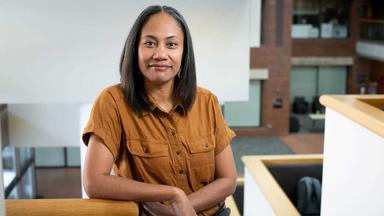
By Ann Nordby
Kristin Sako had a number of experiences after completing her bachelor's degree in neuroscience. She considered becoming a dentist, but decided it was not for her. She worked as a medical scribe in a hospital. She ran with people who had been incarcerated. She got her hands dirty doing habitat restoration along the Mississippi River.
Working in both a hospital and a dental office had shown her how much waste was built in to medical processes. The one-way "take-make-waste" process bothered her.
Doing habitat restoration and conservation with a crew of teenagers was much more satisfying, but it seemed so far from what she had studied to become.
"That work was a lot dirtier and physically harder but I was so much happier, even when it was 100 degrees," she said recently. "There was one thing that tied these experiences together—health care sustainability."
Sako is now a second-year student in the Master of Science in Science, Technology, and Environmental Policy (MS–STEP) program at the Humphrey School of Public Affairs. It's one of the leading such programs in the nation, preparing students to integrate science with policy to solve grand challenges like these.
"It's meant for people like me, with no background in policy, no industry experience, no experience in nonprofits," Sako said. "It's great for people who are transitioning in or out of a life sciences career. It's a pivot. That's why I'm really glad I went to this school. For me, it's been perfect."
Health care sustainability: A new field of expertise
According to one study, America's health care system accounts for 8 percent of the country’s total carbon emissions. Most hospitals do not have dedicated sustainability staff tackling this issue. Hospital staff are usually focused on urgent day-to-day health care problems.
"Hospitals are kind of unusual institutions—they're a business, but also a public health service. Their main thing is to protect the health of humans," Sako said. "But does that stay within the four walls of your facility, or does it go further than that?"
While doing her coursework at the Humphrey School, Sako has been finding out all she can about the new field of health care sustainability. Becoming sustainable relies on individuals with a passion. There are no federal mandates or even state-level requirements for hospitals to become sustainable. These initiatives might include reducing the amount of single-use materials and packaging, shifting to renewable energy for heating and cooling, or replacing all lighting with LEDs.
Since so few hospitals have sustainability officers, those who do this work are doing so because they or other staff care passionately about the issue and have made it a part of their jobs.
"Right now the landscape is driven by pioneers," she said. "The cool thing about that is everybody comes from a different background, and their own personal reason why they started caring. They are doing what I want to do."
Humphrey School support
Sako is carving out a place for herself in this nascent field in several ways. As she completes her coursework, she has had two work experiences. The first is with the Citizens Utility Board. She speaks with hundreds of Minnesotans at tabling events and workshops about how to be more energy efficient, save money on their energy bills, and participate in the clean energy transition.
More recently, she was awarded a National Science Foundation Circularity Impact Fellowship to work with the City of Minneapolis’s Energy Benchmarking team. She analyzes and categorizes energy-efficiency projects across Minneapolis's built environment, focusing on health care facilities. This fellowship gave her a stipend to pay for her second year of study.
Circularity means that products are designed with their end of life in mind, or looped back into the system to be repurposed.
"This fellowship has opened many academic and professional doors for me into the field of circularity, and has further allowed me to focus on topics I am already deeply interested in," Sako said.
She had the opportunity to share her findings about the City of Minneapolis energy audit process at the National Science Foundation's trainee conference.
Sako is completing her degree this month, providing her with the skills and the network to find or create the right job. She knows that she may have to convince a health care executive that there are compelling reasons to invest in sustainability—and hire her.
"It's so new it's not yet structured," she said. But she feels ready to carve out that position herself using the network she has already developed while in the program.
"The Humphrey School has supported me so much that I can take this initiative myself to find a position that probably doesn't exist yet."

